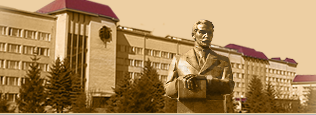GEOSTRATEGIC INTERESTS OF UKRAINE IN THE WESTERN BALKANS REGION IN THE CONTEXT OF NEW GEOPOLITICAL REALITIES
The course of relations between Ukraine and the states of the Western Balkans Region (WBR) formed as a result of socio-political transformations during in our country has been analyzed in this article. For a meaningful analysis in the two-way relations characterization, general features of the relations formation in the early 90’s have been presented, in which solid implementation of the constructural legal framework with the majority of the region states and also the selectivity of cooperation are indicated. Moreover, we characterize the theoretical foundations of a balanced constructive geostrategy, mainly, through the research in such dimensions as geopolitical (the government relation to the violation of integrity of Ukraine, support on the international stage, political contactspeculiarities); geoeconomic (the dynamics of foreign trade turnover of commodities and services, the possibility of their intensification, in particular, transport and logistics connections); geo-cultural (peoples’ general to Ukraine, peculiarities of cultural and humanitarian cooperation, the activity of cultural societies of our compatriots in the subjects of the WBR and the loyalty of the state authorities to their functioning. The comprehensive analysis is being carried out according to the geopolitical directions of interaction. The first area covers such NATO-EU countries as Slovenia, Croatia and Montenegro (which has recently won the membership in the North Atlantic Alliance. These states should become Ukraine’s main allies in Euro-Atlantic integration. According to the second approach, Serbia, with its geopolitical ambitions of regional leadership and foreign policy maneuvering between the West countries and Russia, which is reflected in the Ukrainian-Serbian relations should be emphasized. The attention is also paid to the Republic of Kosovo, partially recognized by international community, and with which our state does not have diplomatic relations. The third area covers the countries with Muslim political influence, in particular Albania, Bosnia and Herzegovina and the FYR Macedonia. This factor should always be taken into account when constructing bilateral relations, especially in case of internal political uncertanity of these subjects. Suggestions about the formation of a balanced constructive geostrategy of further relations of Ukraine with all countries of the WBR at the direct level are given. The emphasis is placed on the underestimation of relations with a majority of states, except Slovenia, Croatia and the FYR Macedonia. It is determined that eurointegration processes, intensification of trade and economic development with appropriate science-intensive production should become a long-term guarantee of relations stability with each country. It is determined that European integration processes, intensification of trade and economic development with appropriate science-intensive production should become a long-term guarantee of relations stability with each country. A desirable significant addition to this is the cultural and humanitarian work, in particular, diaspora support and mutual languages learning. The dynamic cooperation continuity in different spheres will only strengthen permanent human contacts.
Key words: balanced structural geostrategy, Ukraine, Western Balkan region, geopolitical realities, bilateral interstate relations.
References:
- Herasymchuk V.H Krainy Balkanskoho Rehionu v strukturi zovnishnoi torhivli Ukrainy // Ekonomichnyi visnyk NTUU «KPI» – Vyp. №14 (2017) [Elektronnyi resurs] – Rezhym do-stupu: http://ev.fmm.kpi.ua/article/view/108747/103693
- Dnistrianskyi M.S. Politychna heohrafiia ta heopolityka Ukrainy: Navchalnyi posib-nyk. – Ternopil: Navchalna knyha – Bohdan, 2010. – 344 s.
- Zubyk A.I. Suchasna ukrainska diaspora: rozselennia, sotsio- i demoheohrafichni protsesy: dys. kand. heohr. nauk : 11.00.02 / Zubyk Andrii Ihorovych – Lviv, 2016. – 340 s.
- Koroma N.S. Stanovlennia obiektno-predmetnoi sutnosti politychnoi heohrafii ta heo-polityky / Nataliia Koroma // Heopolytyka y ekoheodynamyka rehyonov – Tom 10, Vypusk 2, 2014. – s. 119 – 124
- Liskyi Bohdan « Ukraintsiv v Bosnii i Hertsegovyni staie vse menshe» // hazeta ukrains-koi diiaspory «Svoboda» [Elektronnyi resurs] – Rezhym dostupu: http://svoboda-news.com/svwp/%D1%83%D0%BA%D1%80%D0%B0%D1%97%D0%BD%D1%86%D1%96%D0%B2-%D0%B2-%D0%B1%D0%BE%D1%81%D0%BD%D1%96%D1%97-%D1%96-%D0%B3%D0%B5%D1%80%D1%86%D0%B5%D2%91%D0%BE%D0%B2%D0%B8%D0%BD%D1%96-%D1%81%D1%82%D0%B0%D1%94/
- Nahirnyi M. Khorvatsko-serbska viina: uroky dlia Ukrainy // Naukovi zapysky Terno-pilskoho natsionalnoho universytetu imeni Volodymyra Hnatiuka. Seriia: Istoriia. – 2015 – Vyp. 1 (2). – S. 207 – 210. [Elektronnyi resurs] – Rezhym dostupu: http://nbuv.gov.ua/UJRN/NZTNPU_ist_2015_1(2)__43.
- Tkachyk O. O. Ukrainsko-serbski zviazky kriz pryzmu diialnosti hlav derzhav (1999 – 2008 rr.) // Istorychna panorama. – 2013 – Vyp. 16. – S. 116 – 125. – [Elektronnyi resurs] – Rezhym dostupu: http://nbuv.gov.ua/UJRN/Istp_2013_16_10.
- Ofitsiinyi sait Derzhavnoi sluzhby statystyky Ukrainy [Elektronnyi resurs] – Rezhym dostupu: http://www.ukrstat.gov.ua/
- Ofitsiinyi sait Parlamentskoi hrupy druzhby «Ukraina – Makedoniia» [Elektronnyi resurs] – Rezhym dostupu: http://ukrmkd.com/
- Ofitsiinyi sait posolstva Ukrainy v Hretskii Respublitsi [Elektronnyi resurs] – Rezhym dostupu: http://greece.mfa.gov.ua
- Ofitsiinyi sait posolstva Ukrainy v Respublitsi Serbiia [Elektronnyi resurs] – Rezhym dostupu: http://serbia.mfa.gov.ua/ua
- Ofitsiinyi sait posolstva Ukrainy v Respublitsi Sloveniia [Elektronnyi resurs] – Rezhym dostupu: http://slovenia.mfa.gov.ua/ua
- Ofitsiinyi sait posolstva Ukrainy v Respublitsi Khorvatiia [Elektronnyi resurs] – Rezhym dostupu: http://croatia.mfa.gov.ua/ua
- Ofitsiinyi sait posolstva Ukrainy v Chornohorii [Elektronnyi resurs] – Rezhym do-stupu: http://montenegro.mfa.gov.ua/ua
- Sahan H. Aktualizatsiia «rusynskoho pytannia» v Khorvatii na pochatku KhKhI st. // Pro-blemy slovianoznavstva. – 2016 – Vypusk 65 – S. 201 – 208 [Elektronnyi resurs] – Rezhym dostupu: http://ev.fmm.kpi.ua/article/view/108747/103693
- Tomash Yu. Dvostoronni vidnosyny Ukrainy i Serbii // Naukovyi visnyk Dyplomatychnoi akademii Ukrainy. – 2010 – Vyp. 16. – s. 32-37 [Elektronnyi resurs] – Rezhym dostupu: http://nbuv.gov.ua/UJRN/Nvdau_2010_16_7.
- Frolov M.O. Ukrainsko – chornohorski vidnosyny: desiatyrichchia zdobutkiv i podolannia problemnykh pytan (2006 – 2016 rr.) // Naukovi pratsi istorychnoho fakultetu Zaporizka na-tsionalnoho universytetu – 2016 – Vyp. 46. – S. 316 – 354 [Elektronnyi resurs] – Rezhym do-stupu: http://nbuv.gov.ua/UJRN/Npifznu_2016_46_59
- Khmelova I.Ie. Mizhnarodne – pravove vyznannia Respubliky Kosovo // Molodyi vchenyi – 2017. – № 7. – S. 406 – 409 [Elektronnyi resurs] – Rezhym dostu-pu: http://nbuv.gov.ua/UJRN/molv_2017_7_92
- Shylova A. Stanovlennia y rozvytok vidnosyn Ukrainy z krainamy kolyshnoi SFRIu yak faktor zmitsnennia stabilnosti na Balkanakh // Visnyk Kyivskoho natsionalnoho universy-tetu imeni Tarasa Shevchenka. Istoriia. – 2010 – Vyp. 103. – S. 47-51 [Elektronnyi resurs] – Rezhym dostupu: http://nbuv.gov.ua/UJRN/VKNU_Ist_2010_103_1692
- Republic of Kosovo condemns the aggression on Ukraine // Official website Ministry of Foreign Affairs Republic of Kosovo [Електронний ресурс] – Режим доступу: http://www.mfa-ks.net/?page=2,217,2316
